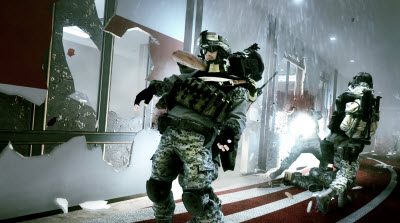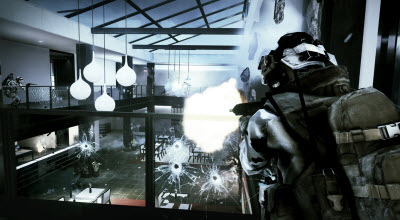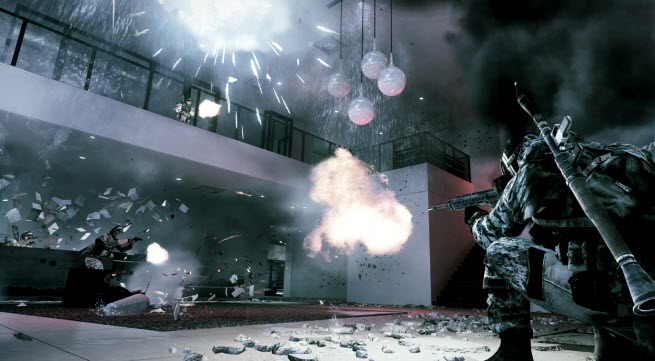As the head of the EA Games label, Patrick Soderlund (pictured) oversees Electronic Arts’ Medal of Honor, Battlefield, Need for Speed, Dead Space, and other hardcore gaming properties. That amounts to a huge chunk of the company’s revenues and one of its most competitive segments.
Last week, EA announced its Medal of Honor Warfighter game and new downloadable content (DLC) expansions for Battlefield 3. Both of these are big launches in EA’s ongoing battle with Activision Blizzard, publisher of Call of Duty, in the multibillion-dollar first-person-shooter market. We caught up with Soderlund shortly after the announcement at EA’s Medal of Honor and Battlefield party during the Game Developers Conference. (See our preview of Battlefield 3: Close Quarters). Here’s an edited transcript of our interview.
GamesBeat: Please tell us about your background.
 Patrick Soderlund: I joined EA in 2006, via the acquisition of the DICE studio. At the time I was still running DICE for EA. As time went on, I got a little bit more to do. I started by running a couple of other studios for EA and then moving to oversee all the shooter business and then the driving business. And then eventually, fast forward, today I now oversee the Games label for EA.
Patrick Soderlund: I joined EA in 2006, via the acquisition of the DICE studio. At the time I was still running DICE for EA. As time went on, I got a little bit more to do. I started by running a couple of other studios for EA and then moving to oversee all the shooter business and then the driving business. And then eventually, fast forward, today I now oversee the Games label for EA.
GamesBeat: What’s the evolution been like? It seems like the investment in shooters has been going way up.
PS: It has. For me, coming from a single studio working on multiple brands and multiple studios has been exciting. And also being a part of transforming a couple of things inside the company has been rewarding for me.
GamesBeat: That includes the reboots of these two franchises, Medal of Honor and Battlefield?
PS: Absolutely. Battlefield moving to console with the Bad Company series was a big thing for us. It was also the first time we did single-player in the Battlefield franchise. And then fast-forward to Bad Company 2, which was the first real breakout hit for the Battlefield franchise, with a substantial amount of units sold. And then obviously to the even bigger Battlefield 3 that we launched in October.
With Medal of Honor, it’s been interesting. I came in kind of late to the Medal of Honor reboot, the 2010 version. That was interesting because they had moved away from World War II. They had gone modern, and that was interesting for the team. They had to take a different approach in how they designed the product. And now, today, what you’re going to see in Medal of Honor Warfighter is the next step. It’s the most ambitious Medal of Honor product to date, I think it’s the best-looking by a country mile.
GamesBeat: So you’ve had a continuous improvement going on, the ratings for Battlefield 3 were better [though not at GamesBeat], and the sales were a lot better than Medal of Honor as well. How do you make that happen?
PS: Quality will come from many things, in many ways. A lot of people point to Battlefield 3, and they talk about the Frostbite technology. We made a conscious decision to invest in new technology. We realized that technology is going to be the enabler that gets us over the hump, so to speak, into this next generation of products.
We didn’t build tech for the sake of building tech. We looked at it and said, “We need to provide the consumer with a different kind of teamwork experience and to do so we need new technology.” We identified certain areas; we looked at things that break the illusion of reality. For us it was animation. We needed to take a giant leap in animation, and we did that.
We looked at something that a lot of people tend to forget, which is audio. We said, “We need to do a lot better at audio than we have.” We invented what we call the High Dynamic Range audio, which is what you hear in the Frostbite engine. And lastly, we also said, “We need a much higher-fidelity rendering engine and a much better destruction system.”
 GamesBeat: So I guess the main competition has one big franchise. You’ve got two. That’s a good thing, right?
GamesBeat: So I guess the main competition has one big franchise. You’ve got two. That’s a good thing, right?
PS: Well, we have several. We have Medal of Honor; we have Battlefield; we have Need for Speed. We have Dead Space; we have a bunch of [intellectual properties] in our portfolio, and that’s where I think it’s our responsibility to nurture those and make them better and bigger. And also to bring out new intellectual properties for EA and for the Games label.
GamesBeat: I guess Activision made this leap a while ago — Ubisoft with Assassin’s Creed as well — a big franchise coming out every year. Is that what you have in mind, or is that somewhere you want to get to?
PS: Well, right now we’re focused on the Medal of Honor game. That’s coming this year. We shipped Battlefield last year, so that’s one way of looking at it.
GamesBeat: And I take it you’re learning a lot by doing one and applying it to the next across these franchises….
PS: What you’ll also see today is that Medal of Honor is now on the Frostbite tech. That will be visible when you see it. Again, it’s about consistently improving and consistently refining a recipe but also finding that if you take some bold risks, you can come up with some new, innovative ideas.
GamesBeat: What are the fans really asking for, and what are you trying to deliver?
PS: Well, the Games label, which is what I oversee, is actually full of fans. We are the fans. Let’s never forget that we are here to make games that we want to play. And arguably, if we make a game that we think is great and that we want to play — obviously we need to be objective — but if you do that you’re ultimately going to win over the audience. Because we are the audience. That’s one way of looking at it, and that’s the approach that we take. That’s really worked for us.
GamesBeat: Are you really shooting to raise the review scores on the games as well?
PS: Yeah. The people who know me and who work for me will tell you that I’m a hard man to work for when it comes to quality. I push my teams to the extreme to achieve quality. Again, it’s not for the sake of reaching a score. It’s because I want the best possible game in the hands of the consumer. I want them to look at it and say, “Wow, did you see that?”
GamesBeat: How do you look back on the Battlefield 3 launch?
PS: I’m extremely proud of both the team and what EA, frankly, as a company, was able to achieve. We took this thing and we really put everything we had in it, and we launched a game that was not only successful but is one of the most successful games in the history of EA. I’m extremely proud of that, and I think people out there need to understand. We see this as a start. This is where we start, and now we go forward. I think that’s the mentality I have; that’s the mentality the team has. People who have invested in the Battlefield franchise can expect a lot more from us.
GamesBeat: You had some critics, too. Is there anything you’re taking to heart from that quarter?
PS: A part of the quality process is to be very, very self-aware and realize where you have problems. Obviously, talking to others, talking to critics, reading reviews, talking to consumers, which we do all the time, is key to learning and understanding what was great and also what wasn’t so good. And then you take that to heart and change it and go forward.
People out there need to understand that the people who make these games want nothing but to please the people outside. When you have 10 million or more people buying a product, it’s going to be hard to make sure that every single one of them is happy. But the majority of people we listen to. We want to improve, and we want to make a better experience for those people.
 GamesBeat: The game’s story and the server access were issues that critics raised.
GamesBeat: The game’s story and the server access were issues that critics raised.
PS: I wouldn’t actually say server access was that big [a deal]. We had a little bit of a hiccup at the beginning, but overall, we did really well. If you look at all the major games shipping, I know of other games shipping in our industry that had a bunch of problems. When you launch a game of that size, I don’t think it’s acceptable for us to say, OK, we’re going to just accept the problem. We’re always going to strive to have a perfect launch and get it done. But we also have to realize that things may go wrong, and I think it’s how we approach it when it does go wrong that’s the most important thing. Clear communication to the consumers about what may be wrong, that we’re fixing it, and then run as quick as you can and fix the problem.
EA PR rep: For what it’s worth, this crosses from Patrick’s portfolio into Star Wars: The Old Republic. A lot of the lessons that Patrick learned at the Battlefield launch contributed to a successful launch for Star Wars a month later. The point there is that we learned a lot on Battlefield, and you saw that learning come into play on Star Wars.
And that launch fundamentally changed our business. That launch was great for all of us. Having live teams and transitioning our studios to live teams and having an integrated team supporting the launch in that way forever changed things for us.
PS: It’s a mental switch. It’s something that you have to do as a company, where we went from, “Let’s get this thing out, and maybe we’ll patch it” to “OK, we were pregnant, the baby’s out now, and we have to take care of it every single minute.” [Editor’s note: EA recently patched Battlefield 3.]
GamesBeat: So Battlefield is effectively, say, moving into a service mode first? And then maybe Medal of Honor will…?
PS: We look at it as a 24/7 service. We have people in Stockholm and North America and other parts of the world that are on this every single hour of every single day. 365 days a year. We have an operations team at DICE to look at telemetry data. How are people playing the game, how can we improve the experience? Are they having problems? Are servers down? Are they up? All that stuff.
GamesBeat: Do you think you’ll eventually get to a subscription type of model? And do you also think you’re going to take down Call of Duty?
PS: I think it’s fair to say that we’re looking at that. Like all other companies, we’re looking at how we can maximize our investment in this and get the most out of our investment and get more people playing this product. That may take us to different places, but we’re not really talking about where that is yet.
When it comes to taking Call of Duty down, you know what? I don’t look at it like that. We are in this business because we want to make the best possible products. Call of Duty is a shooter, but it’s a different shooter. And I think they have a market; we have a market. I’m fine with what I’m doing. I’m going to continue innovating and doing as best as I can with my teams. Hopefully that’s going to lead us to more units [sold] and more happy consumers.
![]() GamesBeat 2012 is VentureBeat’s fourth annual conference on disruption in the video game market. This year we’re calling on speakers from the hottest mobile, social, PC, and console companies to debate new ways to stay on pace with changing consumer tastes and platforms. Join 500+ execs, investors, analysts, entrepreneurs, and press as we explore the gaming industry’s latest trends and newest monetization opportunities. The event takes place July 10-11 in San Francisco, and you can get your early-bird tickets here.
GamesBeat 2012 is VentureBeat’s fourth annual conference on disruption in the video game market. This year we’re calling on speakers from the hottest mobile, social, PC, and console companies to debate new ways to stay on pace with changing consumer tastes and platforms. Join 500+ execs, investors, analysts, entrepreneurs, and press as we explore the gaming industry’s latest trends and newest monetization opportunities. The event takes place July 10-11 in San Francisco, and you can get your early-bird tickets here.
[Photo credit: Dean Takahashi]
VentureBeat's mission is to be a digital town square for technical decision-makers to gain knowledge about transformative enterprise technology and transact. Learn More

